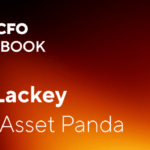How to think like a strategic CFO
Kevin Fleming, CFO at Elder HQ, equates finance to the compass and radar of a ship – it allows you to pinpoint trends while simultaneously guiding your course of action toward sustainable growth.
In other words, finance is more than just ‘back office’ work.
We recently interviewed Kevin on The CFO Playbook podcast, where he explained why strategic business thinking should be at the forefront of all finance operations.
Here are a few of Kevin’s tips to become a more business-minded CFO.
Invest in infrastructure
While investing in your internal systems and infrastructure may not offer upfront monetary gains, it does offer long-term efficiency.
Kevin says:
‘It’s so worthwhile investing time and effort in the infrastructure pieces. What I mean by that is, if I look at those high-volume and low-value [finance functions] from a business perspective, it’s the engine room – it has to operate. It’s not going to necessarily change our business thinking. It’s not necessarily going to drive any decisions. It’s not something the board is going to sweat about, but the basics need to work.’
The more systems and processes you can automate – such as purchase order processes, reconciliations, and bank transactions – the more you can focus on driving growth.
Be agile
In order to be agile, you sometimes need to rip up the rule book and introspectively question your approach to a problem.
Kevin suggests you use ‘sandbox modeling’ or MVPs (minimum viable products) to drive business conversations and gain a more well-rounded perspective of the potential solution.
He explains:
‘We’d start with a financial hypothesis to the challenge at hand. We’d build very simple, high-level models based on half a dozen key metrics that we knew to be important. We had all the relevant people within the business – marketing, frontline, sales, clinical – and we’d talk through what we can do.’
MVPs allow you to create simple solution frameworks you can present to company-wide teams in order to quickly gather feedback. The results from these hypothetical situations can be surprising, Kevin says, but they also open you up to new ideas.
Empower your people
If you want to build a highly motivated team, you need to value the role of each individual.
Every person brings something different to the table, and Kevin says it’s the job of the CFO to recognize and appreciate the unique contributions your employees offer to your team.
When people feel valued, they become empowered, Kevin says:
‘They have ownership of their own role. They know exactly what it is they need to do. They know exactly that if they feel like they can expand, improve, suggest changes, not even necessarily just in their own departments, that they have that opportunity.’
Empowered teams contribute to their jobs on a higher level because they have the autonomy to make change.
Think outside the spreadsheet
Financial leaders need to balance data with real-world insights in order to understand the ‘why’ behind the numbers.
Kevin suggests you think outside the spreadsheet. Go to the frontlines, talk to your teams, and figure out what your numbers truly represent.
He says:
‘Data is king, absolutely. There’s no two ways about it. But also, it’s important to step away from the spreadsheets and actually say, “Does this pass the sniff test?” Particularly when we look at the unit economics, if I see my unit economics going this way with these resources, does that actually make sense?’
When you look beyond the spreadsheet, you gain a different perspective on the situation at hand.
Recruit for the future
Many organizations hire to fulfill immediate gaps in the system versus playing the long-term game. Kevin suggests you think in detail about what you’ll need four to five years down the line, to inform your hiring decisions today.
Kevin says:
‘Recruit the person you need for the future, not the one you need now. You will get 10x the ROI having someone who is better than you think you need. They will take more off your plate. They will grow themselves. They will fill the space in that role.’
Recruiting for the future allows you to pave the way for your business to succeed in the long term.
Understand the business inside and out
The key to becoming a strategic finance leader is to understand every aspect of your business – marketing, customer service, product assembly, sales operations, etc.
The more you know, the better prepared you are to successfully navigate through both stormy seas and times of opportunity.
Sign up to The CFO Playbook Newsletter
Get extra insights from the podcast every Tuesday, to help you thrive in your business and career.







